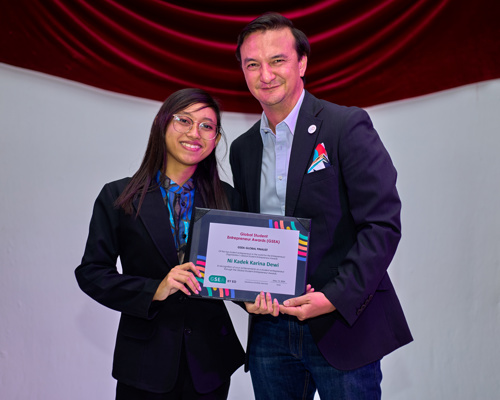Three Defining Traits of Successful Student Entrepreneurs on this International Students’ Day
November 15, 2024
Published in:

Three Defining Traits of Successful Student Entrepreneurs on this International Students’ Day
by Jamie Pujara, Global Board Chair, Entrepreneurs’ Organization
Since 1939, International Students’ Day has been a day when we pause to recognize the many positive contributions made by students in fostering understanding, cooperation, and tolerance across borders and among different cultures and societies. It’s a reminder that the young people in classrooms today are the leaders and changemakers of tomorrow.
I have witnessed this firsthand each year during EO’s annual Global Student Entrepreneur Awards (GSEA), and most especially in 2024 when I had the great honor of serving as a judge and mentor during its finals. This competition brings together the world’s most promising young entrepreneurs from all corners of the globe — ones who already own and operate their own businesses — and have reached the point where they are ready to scale up their companies.
The student entrepreneurs who earned a trip to Cape Town this past year to make their business case personified the three traits that I think set them far apart from many of their peers: resilience, adaptability, and curiosity.
Each trait aligns with how we, as EO’s judges, determine EO’s top student entrepreneurs each year. A substantial 70 percent of our judging criteria weighs the strengths, spirit, and potential of the individual entrepreneur. We prioritize consideration of the students’ character, far more than their actual inventions or business plans. That’s important, because as future business leaders, they will need to carry themselves through adversity, demonstrate agility when the landscape changes, and be able to open their hearts and minds to new ideas and feedback. These are keys to longevity and success in entrepreneurship.
Defining trait #1: resilience. View failure as a lesson, not a loss.
Young entrepreneurs show a lot of grit. They may fail a few times before a business idea leads to success. Yet their resilience strengthens their determination, allowing them to persist as they push on through various challenges, including failure.
The ability to embrace failure goes beyond positive thinking: true entrepreneurs often view a failed business idea not as a setback, but as a lesson to improve their next venture. Across many cultures, failure comes with a stigma that many of us feel uncomfortable with. Entrepreneurs, however, learn to become steeled to perceived stigma. We understand past failures are steppingstones toward future success.
This is why we, as EO member judges, start by evaluating how tenacious each student entrepreneur’s spirit is, how they can overcome challenges, and their commitment to building a better tomorrow. The most promising young entrepreneurs flex resilience like muscle memory, which in turn helps them cope with adversity.
I saw this in person with GSEA’s most recent global winner, Ni Kadek Karina Dewi (Karina) of Indonesia, as her perseverance shone through during last summer’s competition in Cape Town. Karina was the first person in her family to attend college, even though she faced pressure not to continue her education after high school.
Among the many hurdles Karina encountered while building her business in her native Bali, she lost access to wi-fi at a café after its owners realized she couldn’t afford to buy anything. Unfazed, she found a resort near her home where she gained wi-fi access while seated on the ground, just outside its walls. Her determination and tenacity to find a solution that reduces farm waste, provides a clean source of cooking fuel, and reduces carbon emissions, propelled her founding of BioGhum, which manufactures briquettes out of sorghum waste for cooking and heating.
Entrepreneurs like Karina show resilience that transforms into tenacity. They understand that if they do not go after what they want, they will never achieve success.

Defining trait #2: adaptability. Welcome the unfamiliar, embrace the change.
Clearly, entrepreneurs are adept at coming up with new innovations. Where we sometimes encounter difficulty is when the moment calls for us to pivot quickly in order to navigate chaos, whether it involves economic change, market shifts, or personal challenges. The willingness to adapt to a new environment and an understanding of how such changes could impact our products and services prime entrepreneurs for success. We cannot always stay welded to our original ideas.
Adaptability also manifests itself in the ways young entrepreneurs integrate their dual roles – as students and business owners. If students can manage the demands of coursework while running a business, they are likely well positioned later in life to balance the needs of their families, local communities, and companies.
For Karina, my fellow EO judges and I saw her adaptability transform into courage. As a Global Student Entrepreneur Awards finalist, the largest competition of her life took her abroad for the very first time, and all the way to South Africa. Although we offered her a translator, Karina declined, saying she would deliver her pitch in English. At this point, she had already achieved many firsts in her life. Yet at the most crucial moment in her young career, with everything on the line, she did not back down. She met the moment.

Defining trait #3: curiosity. Open yourself to constant learning.
Entrepreneurs learn quickly that what succeeded yesterday may not necessarily work tomorrow. Intuition is not enough. Instead, a genuine and lifelong thirst for learning is the key – both while they are in school and continuing after graduation. That’s why the student entrepreneurs who have stood out most to me are the ones who, during coffee breaks, have come up to me and my peers with questions. Some even go so far as to challenge our assumptions. They acknowledge that it is not enough to simply show up. Instead, they network and while doing so are brimming with ideas. That constant thirst for learning is another important component when our GSEA judges evaluate the competitors.
A successful entrepreneur’s inherent curiosity goes hand-in-hand with an understanding that, as my EO friend and peer David Nilssen often says, finding a solution in business means falling in love with the problem. The problems we, as entrepreneurs, face cannot always be solved by finding a quick answer. Rather, they require continuous networking and opening ourselves to new ideas. This allows us to keep adapting and digging deeper; not just thinking we already have the answer. By taking that incremental approach to learning, while embracing tactics like brainstorming or meeting prospective partners over coffee, students become equipped to build on momentum and find long-term success.
Bottom line, many of today’s young entrepreneurs have channeled their resilience into a drive to make this a better world. They are learning to adapt to changes in business not from a place of ego but from acceptance of the constant nature of change. And they are opening themselves up to continued learning that will help them think even bigger and more boldly about the future.
We can all learn from Karina’s example, as well as those from our other top student competitors. If we don't follow our curiosity by asking questions, the answer will always be no. Their example gives me hope.